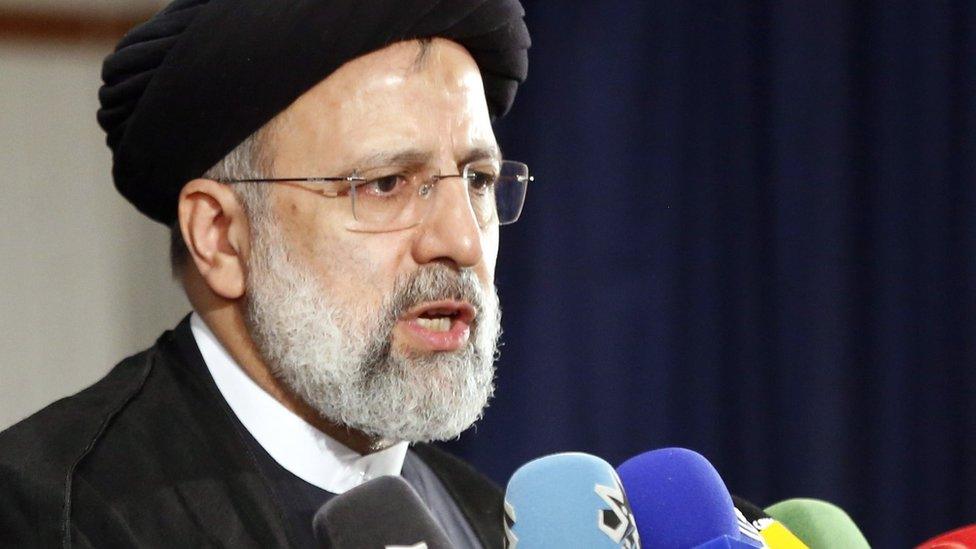Iran presidential election: Hardliners dominate approved candidates list
- Published

Ebrahim Raisi is a cleric with close ties to Supreme Leader Ayatollah Ali Khamenei
Iran's Guardian Council has approved seven mostly hard-line candidates for next month's presidential election and barred several prominent contenders.
Judiciary chief Ebrahim Raisi will now be seen as the clear frontrunner to succeed Hassan Rouhani, a moderate.
Mr Raisi is a cleric with close ties to Supreme Leader Ayatollah Ali Khamenei.
Eshaq Jahangiri, Mr Rouhani's first vice-president, and Ali Larijani, a conservative former speaker of parliament, were not allowed to run.
"The disqualification of many qualified people [is] a serious threat to public participation and fair competition among political tendencies, especially reformists," Iranian media quoted Mr Jahangiri as saying.
The 12 theologians and jurists on the Guardian Council, an unelected body, have the ultimate decision with regard to candidates' qualifications.
BBC Monitoring's Kian Sharifi explains why Iranians have been queueing for chicken
Besides Mr Raisi, the other hardliners approved to run on 18 June are former Supreme National Security Council secretary and nuclear negotiator Saeed Jalili; Expediency Council Secretary Mohsen Rezaei, a former head of the Revolutionary Guards; and MPs Alireza Zakani and Amirhossein Qazizadeh-Hashemi.
Central Bank of Iran governor Abdolnaser Hemmati, a moderate, and reformist former Vice-President Mohsen Mehralizadeh make up the list.
Mr Rouhani beat Mr Raisi by a landslide in the last election in 2017, but he is not allowed to stand again after serving two consecutive terms.
Since then there has been rising discontent in Iran over the state of the country's economy, which has been crippled by US sanctions reinstated in 2018 by then-President Donald Trump when he abandoned a nuclear deal negotiated by Mr Rouhani.
The election result could affect the outcome of talks on trying to revive the nuclear deal currently taking place in Vienna. US President Joe Biden says he will re-join the accord and lift the sanctions if Iran resumes abiding by its nuclear commitments. Hardliners say the US cannot be trusted.

'Hard-liners engineering a landslide'
Analysis by Kasra Naji, BBC Persian
The disqualification of the less hard-line candidates has effectively turned Iran's presidential election into a one-horse race. Ebrahim Raisi, the most hard-line of the approved candidates, is almost certain to win.
Already, it appears a landslide is being engineered. The Revolutionary Guards-backed Fars news agency published the results of what it described as a "reliable" opinion poll predicting a turnout of almost 53% and Mr Raisi winning 72% of the vote. He seems to have been the only serious candidate that hardliners could agree on to avoid splitting the conservative vote. Most of the other candidates allowed to run have been tested before in previous elections - they either withdrew from the race or won just a few per cent of the vote.
Mr Raisi was the main challenger to Hassan Rouhani in the last election four years ago. He won 38% of the vote in the first round, compared to 57% for Mr Rouhani. During that campaign Mr Rouhani warned of the conservative Islamic restrictions that Mr Raisi would impose on Iranians if he won.
Mr Raisi is one of a small group of clerics that signed off on the executions of thousands of political prisoners in 1988 on the orders of the then-Supreme Leader, Ayatollah Ruhollah Khomeini. For his role in the executions, he has been sanctioned by the US government. His election as president would concern many Iranians as well human rights activists.
